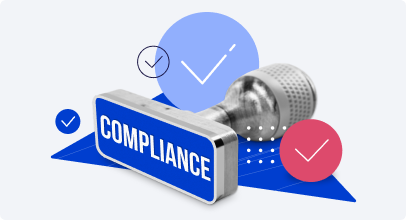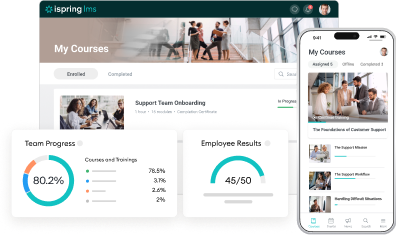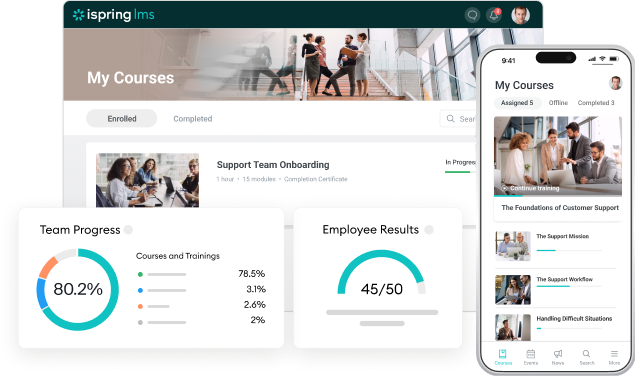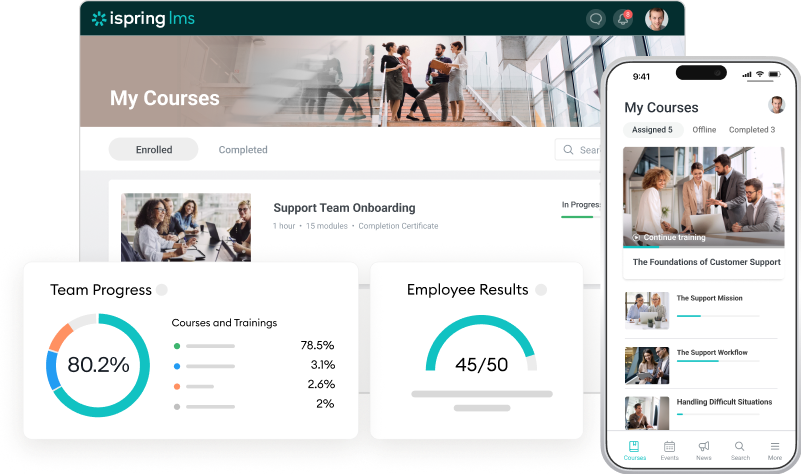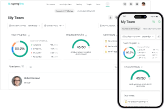The Top 10 Compliance Training Software to Boost Knowledge

Corporate compliance training can quickly become overwhelming with constantly changing regulations and updates. That’s why most of businesses now use learning management systems (LMS) to track and manage compliance training.
But what type of LMS should you choose? Most companies from highly regulated niches choose compliance-focused software over generic platforms to avoid gaps and risks. These specialized tools:
- Automate tracking.
- Manage certifications.
- Provide real-time updates.
- Keep everyone aligned.
In this article, we’ll explore whether your company needs compliance training software, the key features to look for, and our top picks for 2026.
| Platform | Best for | Pricing |
| iSpring LMS | Companies needing an easy-to-use LMS and an authoring tool to launch and update a compliance training program quickly | $4.46/user/month (billed annually), 30-day free trial |
| 360Learning | Collaborative course development with internal subject matter experts | Starts at $8/month for up to 100 users |
| EdApp | Mobile-first microlearning and on-the-go training | Starts at $5/month, free for up to 10 learners |
| TalentLMS | Multi-brand organizations needing separate training portals | Starts at $119/month for 40 users, free for up to 5 users |
| Docebo | Large enterprises requiring extensive automation and AI personalization | Custom pricing |
| Litmos | Healthcare organizations that require ready-to-use compliance training solutions | Custom pricing |
| Absorb LMS | Organizations requiring advanced analytics and business intelligence | 21-day free trial, custom pricing |
| WorkRamp | Companies requiring strict documentation with e-signatures | Custom pricing |
| Cornerstone | Global enterprises with complex, multi-region compliance needs | Custom pricing |
| Adobe Learning Manager | Enterprises using Adobe tools for training | Custom pricing |
What Is a Compliance Training Platform?
A compliance training platform (or software) is a specialized learning management system (LMS) that makes compliance training delivery and management easier and more efficient.
An online compliance training program educates employees on the rules, laws, and policies they need to adhere to at work to ensure ethical behavior, legal compliance, and alignment with company standards. It covers key topics like workplace safety, data privacy, anti-harassment policies, and cultural practices, helping employees create a safe, inclusive work environment built on accountability and ethical behavior.
The platform’s goal is simple: make a compliance training program engaging and effective through online lessons, interactive videos, and/or simulations. Plus, it can track employee progress, manage certifications, and send updates about new requirements for better management.
Which businesses can benefit from an LMS for compliance training?
Staying compliant is essential across most industries, but compliance training software is a must-have for certain highly regulated sectors. These include:
Banking and financial services
Their training programs focus on regulatory compliance requirements for transactions, data protection, and anti-money laundering practices, thus mitigating non-compliance risks.
Healthcare
Organizations require healthcare compliance training software to teach staff about privacy laws (e.g., HIPAA) and patient rights, maintaining safety standards, and improving patient care.
Retail
Compliance training in retail companies is about following consumer protection laws and product safety standards, while also covering data protection of customer information.
Construction
Construction businesses must work with Occupational Safety and Health Administration (OSHA) safety compliance training software to maintain protocols and environmental regulations to prevent accidents and avoid fines.
IT
Training on data privacy laws like GDPR and cybersecurity protocols is essential for IT employees to protect sensitive data and prevent breaches.
Why are compliance training platforms important?
Unlike a general LMS, compliance LMSs are crucial because they offer the following specialized features to demonstrate compliance training for all employees and keep them updated.
- Centralize resources in one place and reduce the risk of lost/outdated documents and penalties.
- Automatically track employee progress, completion rates, and performance — no need for manual follow-ups.
- Generate real-time custom reports that help admins identify training gaps, spot compliance issues early, and take action promptly.
- Promote accountability by regularly reminding employees about training and deadlines.
- Reduce training costs by cutting down on manual scheduling, reporting, and tracking.
What Are the Types of Compliance Training to Consider?
If you’re new to compliance training, here are the major types you’ll likely add to your overall training program. By understanding the type of compliance training your company needs, you’ll get a better idea of the features your compliance training software should have.
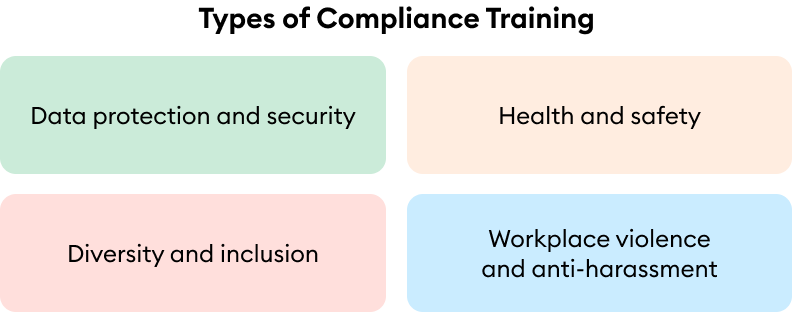
For example, a healthcare organization launching HIPAA training will need software that supports detailed role-specific scenarios — like simulating patient confidentiality conversations for nurses and doctors. In contrast, a tech startup implementing cybersecurity awareness training will require a platform that can rapidly update content to reflect the latest digital threats, ensuring that employees are always protected against emerging cyber risks.
1. Data protection and security
Training programs on data protection and security teach employees how to protect confidential information from breaches or theft. They cover topics like secure storage, privacy laws like GDPR and HIPAA, and safe communication.
This type of compliance training is common among businesses in healthcare, finance, and tech. If they fail to comply, it can lead to hefty fines and affect the company’s reputation.
2. Health and safety
Health and safety training focuses on the physical and mental well-being of your employees. It teaches them how to stay safe at work, follow safety rules, and prevent accidents through topics like proper use of equipment, emergency procedures, and spotting hazards.
This training is important for construction, manufacturing, and healthcare companies, where safety risks are higher. US organizations like OSHA (Occupational Safety and Health Administration) often set rules to maintain a safe workplace.
3. Diversity and inclusion
Diversity and inclusion training is a key focus for many organizations today, thanks to changing laws and workforce demographics. Its goal is to create an inclusive work environment by reducing biases and promoting fairness.
This type of training goes beyond the basics of ethics and focuses on cultural sensitivity and self-awareness. It helps employees and leaders recognize and challenge biases, making the workplace more welcoming and supportive for everyone.
4. Workplace violence and anti-harassment
As the name suggests, this training teaches employees how to spot and prevent potential threats and harassment. It covers warning signs, types of harassment, related laws, incident responses and reports, and bystander intervention, helping create a safe and accountable workplace. This training is key to meeting safety and legal regulations.
Must-Have Features of a Compliance Training LMS
Before you choose, here are the essential features of a compliance training LMS:
- Custom content creation: Integrated authoring tools save time and reduce errors by eliminating the need for manual exports in stand-alone authoring tools and taking extra steps to make content work across systems.
- Assessments: Includes tests to check employees’ understanding of the material, ensuring knowledge retention and identifying improvement areas.
- Interactive learning: Combines eLearning and in-person sessions with interactive scenario-based role-plays, simulations, drag-and-drop games, clickable videos, and discussion forms, helping employees retain compliance knowledge.
- Reporting: Tracks employee training progress and automatically produces detailed reports with accurate audit trails. This reduces manual work and human errors and helps you see who is compliant and who still needs training.
- Automated reminders: Automatically enrolls employees in required courses and sends reminders for deadlines, reducing the chances of missed training.
- Mobile access: Allows healthcare and construction workers to complete compliance training on any device while they’re on the go.
- Certification tracking: Manages certifications, tracks expiration dates, and automates renewals to keep credentials up to date.
The 10 Best Compliance Training LMS Software for Corporate Training
Let’s explore our top 10 corporate compliance training software that will transform the way you train employees in 2026.
1. iSpring LMS
Use iSpring LMS to create courses directly from PowerPoint slides, keep learners engaged with games, and track every detail of their progress.
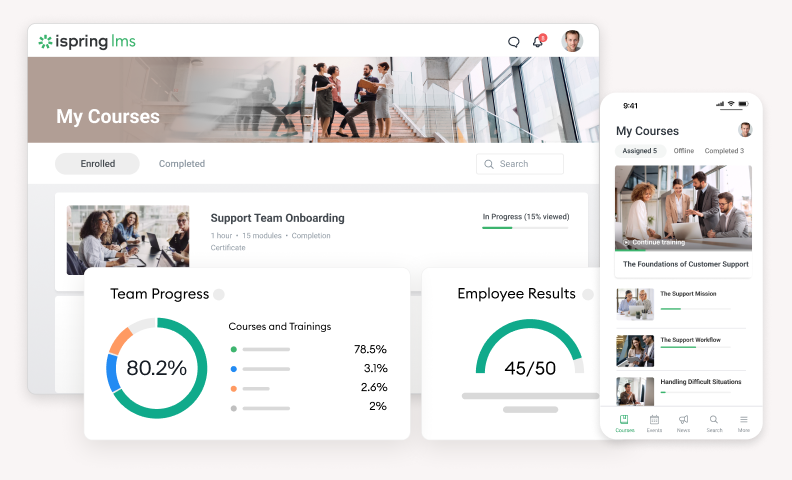
iSpring LMS is a feature-rich, easy-to-use compliance training LMS ideal for organizations that need to implement effective compliance training quickly. It comes bundled with the iSpring Suite eLearning course creation tool that lets you create compliance training courses and assessments, even without any prior eLearning development skills. It also means that content creation is faster than with alternatives.
For instance, one of our clients was able to create compliance training material for 3,200 employees by creating SCORM courses with fixed reading times from their existing PowerPoint presentations.
Using its immersive role-plays and branching scenarios, you can create interactive, step-by-step learning tracks to train a diverse team of employees and improve knowledge retention. Content creation also extends to quizzes and games like drag-and-drop or matching to keep employees engaged.
But nothing beats iSpring LMS’s reporting features. It can track metrics like course views, completion rates, scores, and feedback, providing detailed reports to show who hasn’t read new policies or instructions. This ensures that employees stay updated and apply the latest information in their work.
Meanwhile, you can use custom certificates and automated reminders to keep compliance on track. Your employees can log in using single sign-on, leave comments for course authors, and stay updated through a newsfeed.
Key features
- Content creation. Build eLearning content using the AI-enhanced authoring tool.
- Reporting. Monitor real-time progress on the supervisor dashboard.
- Assessment. Use quizzes, drag-and-drop activities, and surveys.
- Certifications. Create certificates from scratch or readymade templates.
- Interactive learning. Try out different social learning features like newsfeed, learner cards, games, etc.
- Integration. Integrate with platforms like Zoom, MS Teams, Salesforce, and more using API technology.
- Pre-made compliance content. Access a library of ready-made courses.
- Mobile app.
- White-labeling.
Pricing: 30-day free trial, then you can expect to pay $4.46/user/month (billed annually) for 300 users. Custom plans are also available.
2. 360Learning
The 360Learning Dashboard shows metrics like scores, completion rates, and timeframes, along with visual progress reports and learning paths.
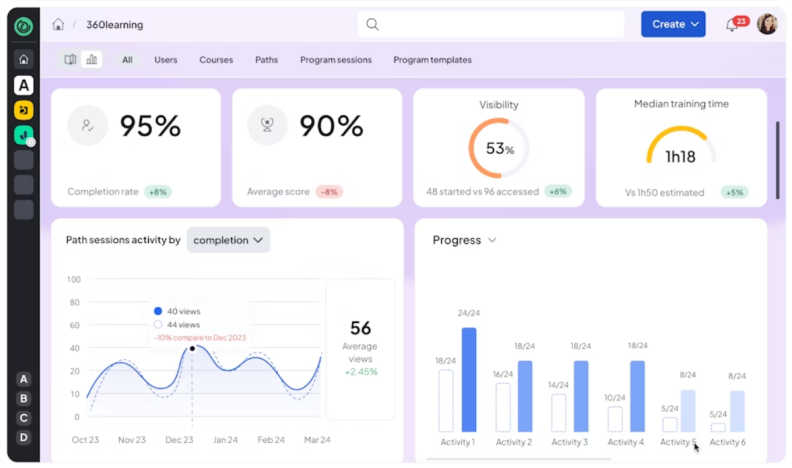
If you frequently update compliance training with input from multiple internal stakeholders, 360Learning could be a good fit for you.
It combines LMS, LXP, and collaborative tools that let you create company-specific training programs (workplace policies, hiring practices) with your internal experts. Plus, social learning tools like discussion forums and Q&A channels on the learning platform facilitate collaboration.
You can also generate automated and custom reports as needed, helping you find out who’s up to date with certifications. These reports provide details on assessment results, knowledge gaps, time spent on courses, and overall progress. You can also set up weekly email reports to send reminders and notify employees about their training progress.
Key features
- Content creation. Its collaborative authoring tool lets your internal experts work on a course creation simultaneously.
- Pre-made compliance training content. Different frameworks and templates facilitate the creation of interactive courses.
- Automation. Handles tasks like course enrollment, reminders, and audit-proof reports.
- Interactive learning. Comment threads, forums, and games for engagement.
- Assessment. Tools for quizzes, surveys, and exams to measure learning outcomes.
- Mobile app. Makes training convenient for those on the go or on break.
- Integrations. Can connect with 50+ tools from their partner marketplace.
Pricing: Two plans — Team (starts at $8/month for up to 100 users) and Business (pricing is available upon request during a demo).
3. EdApp
Get a quick view of progress charts and compliance scores with EdApp’s Performance Dashboard.
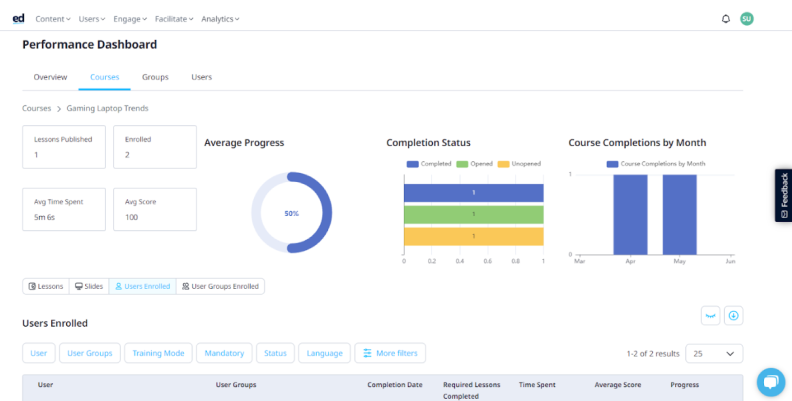
Safety and compliance training programs can be complex and tricky. EdApp, a mobile-first microlearning LMS, eliminates this complexity by breaking the programs into small, digestible modules.
It stands out for its spaced retention method called Brain Boost, which prompts employees to review content at increasing intervals over time. This improves long-term memory retention by reinforcing knowledge just before it’s likely to be forgotten.
EdApp’s reporting feature focuses on user engagement. It shows four types of users: those with partial completions, those who haven’t started, those who never logged in, and those with low completion rates. This helps you notify employees as needed. You also get a performance dashboard with completion rates, scores, timeframes, and more. Plus, you can track certification progress, including who passed or failed.
Key features
- Mobile-friendly interface.
- Interactive learning. Game-like elements like points, badges, and leaderboards.
- Pre-made compliance content. Customizable course library with 1000+ templates.
- Reporting. Actionable reports, in-person training attendance, performance dashboard, and certification tracking.
- Integration: API.
Pricing: Free for up to 10 learners; paid plans start at $5/month for larger teams.
4. TalentLMS
Use TalentLMS to create several such dashboards for multiple brands that cater to different types of audiences.
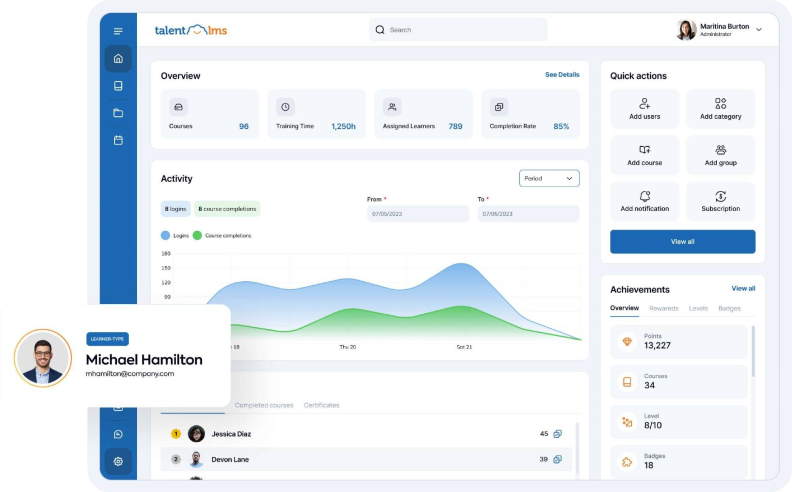
TalentLMS is a good fit for companies that manage multiple brands, like Pottery Barn and GAP.
This cloud-based, white-label LMS lets you personalize training portals and sub-portals, each with its own branding and settings. It helps you create tailored learning experiences for different audiences.
Its reporting features include customizable and scheduled reports, Training Matrix for tracking progress, activity logs for engagement insights, and infographics for easy compliance assessment.
Moreover, TalentLMS has a course builder for updating compliance training content, automation for recertifications, filters for targeting specific teams, and games for engagement.
Key features
- Content creation. AI tools and drag-and-drop, user-friendly interface for course creation.
- Interactive learning. Points, badges, and leaderboards for engagement. Custom user profiles and forums for social learning.
- Custom sub-portals for different audiences.
- White-labeling. Branding options with custom domains and logos.
- Certification. Tracks certificates and allows you to export them.
- Feedback tools. Surveys and ratings for course improvement.
- Integrations. Connects with HR tools, Zapier, and more, along with API.
Pricing: Free for up to 5 users; paid plans from $119/month for up to 40 users.
5. Docebo
Save time and money by automating compliance training processes with Docebo.
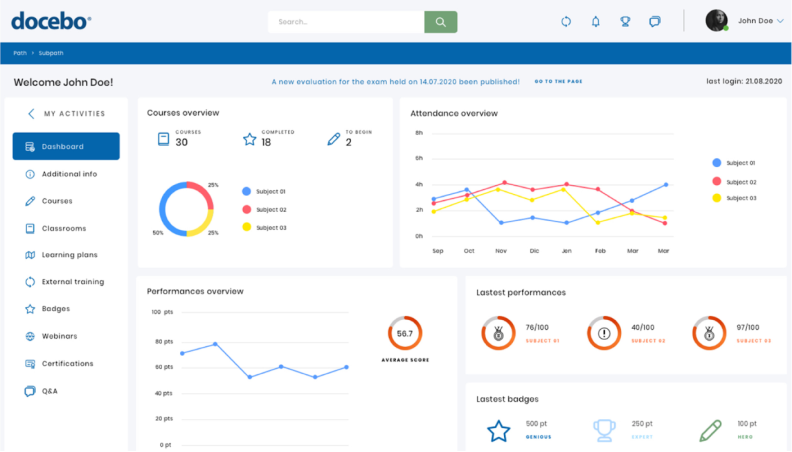
Docebo leads in automation on our list.
Its automation simplifies user enrollment by assigning courses based on criteria like job role or department. Admins can also set workflows to automatically enroll employees when their roles change. Other than that, you can automate notifications for expirations and deadlines and manage certifications with auto-issuance and recertification.
Using its reporting abilities, you can view enrollment data, course progress, and survey results as separate reports. If you need to analyze a specific metric like course performance or user activity, you can create custom reports. Plus, you can track your training progress from your dashboard.
Docebo works with tools like Amazon Elastic Compute Cloud (part of Amazon Web Services), making it easy for your company to scale. It’s thus a great choice for large enterprises with global teams.
Key features
- AI-driven recommendations for personalized learning paths
- Predictive analytics for tracking compliance risks
- Built-in tools and a marketplace for course content
- Certificate management and auto-renewal post expiration
- Integration. Connects with 400+ third-party apps like Salesforce and Zapier. There are also custom integrations available using xAPI.
Pricing: Available upon request.
6. Litmos
Track compliance training in real time with Litmos’ instantly updated reports.
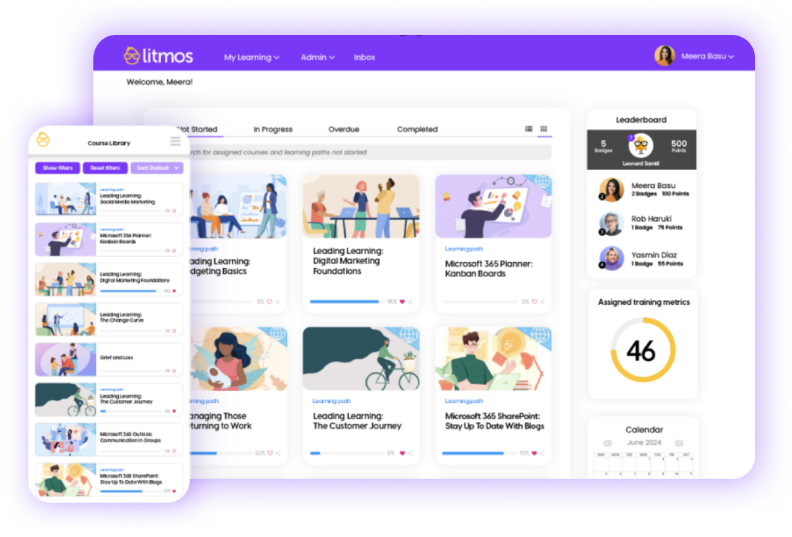
Litmos is a top choice for hospitals and clinics, offering a library of specialized courses like patient experience and revenue cycle. It’s built to quickly deploy mandatory training for regulations like HIPAA compliance.
To track progress, you can use its reporting engine to generate custom reports for specific metrics and even auto-schedule report delivery to your stakeholders. Moreover, this platform supports real-time reporting data that helps you monitor learner progress and compliance metrics instantly. You also get an AI assistant for targeted follow-ups and a comprehensive dashboard complete with completion rates and overdue training.
Key features
- Mobile-friendly learning platform with offline course access.
- Pre-built compliance training content library.
- Content creation. AI-powered content authoring and recommendation engine.
- Real-time compliance training tracking and reporting.
- Integration. Integrates with 40+ popular tools like ADP, Zendesk, and Salesforce via open APIs and connectors.
- White-labeling.
Pricing: Available upon request.
7. Absorb LMS
Take advantage of Absorb LMS’ self-service BI feature to generate comprehensive reports.
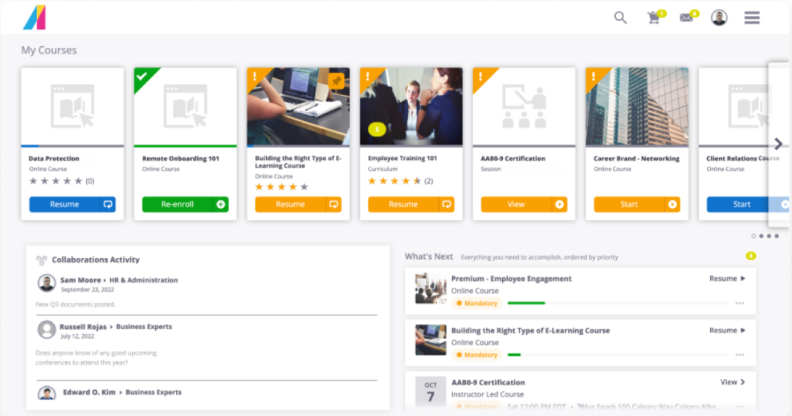
Absorb LMS makes creating and managing compliance courses simple with automated features like scheduled notifications, certificate tracking, and course enrollments. It also gives you access to Absorb Amplify — a library of ready-to-use courses on key topics like ethics, GDPR, OSHA rules, and harassment prevention.
However, what sets it apart is its powerful reporting and analytics tool, Absorb Analyze. It offers self-service business intelligence, meaning you can generate reports and get insights without the need for technical skills. This helps compliance managers make quick, informed decisions. The Absorb compliance training management software also simplifies audits by providing automated, easy-to-read summaries (or narratives) of complex compliance data.
Key features
- AI tools for personalized learning paths and automating admin tasks.
- Customizable dashboard for instructors and trainers.
- Pre-made content library, including LinkedIn Learning and SkillSoft courses.
- White-labeling.
- Integrations. Native integrations with tools like HubSpot and Zoom, RESTful APIs, and webhooks to connect with others.
Pricing: A free 21-day trial is available; pricing is available upon request.
8. WorkRamp
Collect digital signatures from your employees with WorkRamp when they complete compliance courses.
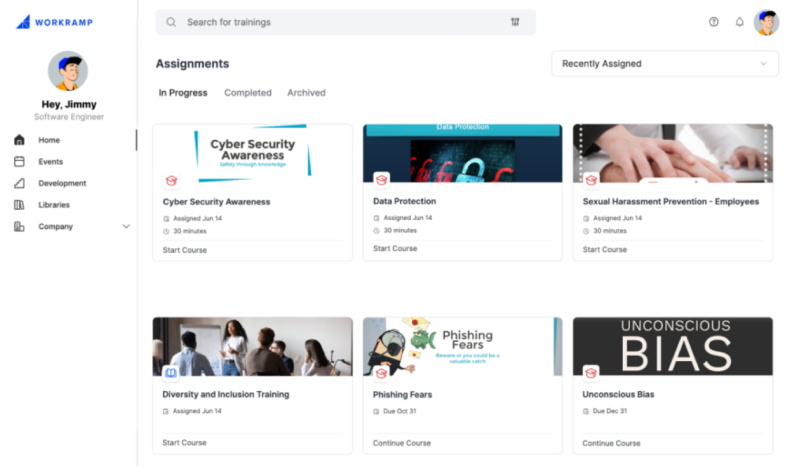
WorkRamp is stricter about course completion than its competitors. Its Learning Cloud includes an eSignature functionality that lets organizations collect digital signatures as proof of course completion. This makes it easy to store and access documents for audits.
The platform also gives you access to a library of pre-built compliance courses specially created by experts. These courses cover various topics for different industries, helping you roll out essential training quickly without extra effort.
As a compliance training tracking software, WorkRamp keeps it simple and detailed with custom reports for different compliance metrics (like completion rates) and automatic scheduling. To make things easier, it also comes with Reporting APIs that are designed to push your training data into other systems.
Key features
- Microlearning courses on compliance training.
- Automated workflows with reminders and notifications.
- Interactive learning. Supports various content types like quizzes, challenges, and Flip Cards.
- Advanced audit-proof reporting tools to track progress in real time.
- White-labeling.
- Integrations. Integrates with 350+ tools like Workday, Okta, HighSpot, and more. Also has an xAPI ecosystem.
Pricing: Available upon request.
9. Cornerstone
Enhance compliance training with Cornerstone’s immersive learning experiences using virtual and augmented reality.
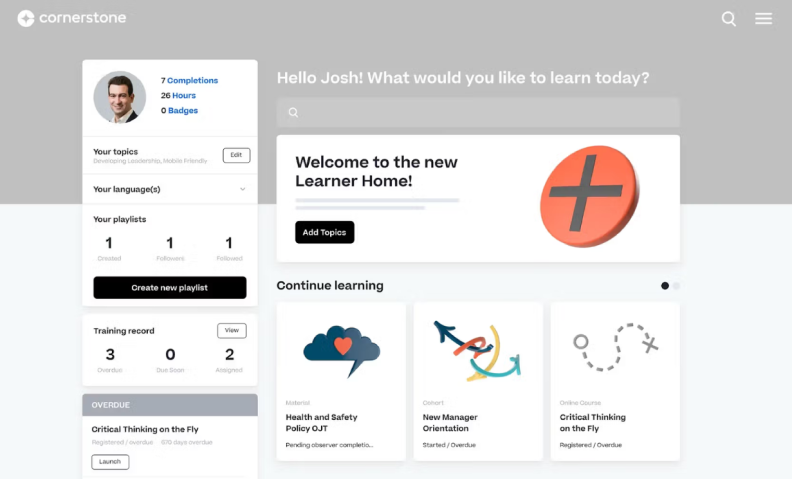
What sets Cornerstone apart is its ability to manage complex training for large, multinational companies with diverse global teams. Without a single glitch! It features an audit trail to reduce compliance risks and automated certification for employee training and recertification.
Reporting features include over 100 standard reports on metrics, like learning progress and certifications, and custom report generation from several flexible data points. You also get personalized dashboards with real-time insights for different roles like HR administrators or senior executives. Plus, similar to the others on this list, you can automate processes like scheduled report delivery for timely updates.
Key features
- Skills intelligence matches courses to fill skill gaps.
- Immersive learning. Supports VR and AR simulations for role-based scenarios.
- In-depth reporting.
- Content creation. Course authoring tool for instructor-led training. AI-powered content tailored to team needs.
- Integration. Pre-built integrations (mainly popular HR systems like Workday), connectors, and flexible APIs, including webhooks.
Pricing: Available upon request.
10. Adobe Learning Manager
Generate multidimensional reports with Adobe Learning Manager and get a more detailed look at your progress.
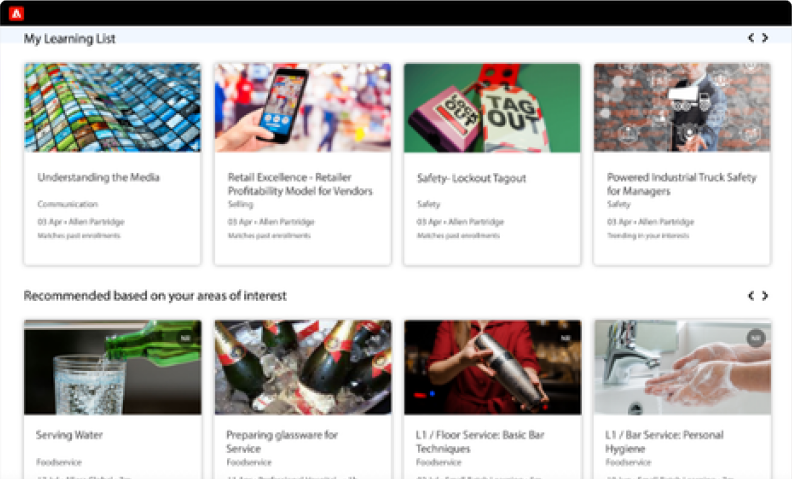
If your company uses Adobe tools heavily, no LMS will fit into your workflow as well as Adobe Learning Manager (ALM).
Offering both offline and online compliance training on mobile and web platforms, ALM supports certification training, helping employees stay updated on regulations.
Learners can easily view different content types, like videos and PDFs, on its unique Fluidic Player without extra plugins or windows. It adjusts controls based on the content and includes features like a table of contents and note-taking, making compliance training a lot less boring.
It comes with an advanced compliance dashboard with insights into course types, learning paths, and certifications, helping admins monitor progress and categorize content. You can produce shareable custom reports for stakeholders and set up automated alerts to avoid missing deadlines and renewals. Admins can also filter the reports based on various criteria, giving them a more granular view of the compliance and engagement metrics.
Key features
- AI tools. Automates progress tracking and customizes learning experiences.
- Gamified courses for engagement.
- Custom dashboards with key metrics.
- Certifications. Automated scheduling and delivery of certification and recertification training.
- Auto-assignment of compliance training based on roles.
- Advanced analytics and reporting tools.
- Interactive learning through games and social learning through discussion boards.
- Integration. Can connect with third-party tools via custom connectors and APIs.
Pricing: Available upon request.
What Should You Consider When Comparing the Best Compliance Training Vendors?
Still puzzled about which LMS to choose from our list? To make an informed decision that aligns with your organization’s needs, consider these key factors when evaluating vendors.
- Native creation tools. In case your compliance training programs require a lot of customization, consider an LMS that comes bundled with an authoring tool or course builder.
- Interactive features. Consider the functionality you need for your types of compliance training.
- Mobile learning. If your employees are often on the go, choose software that has online compliance training software access from mobile devices. This allows more employees to complete courses anytime, anywhere, even without a computer nearby.
- Custom tracking. Your ideal LMS should track the information authorities need for an audit. For example, participation numbers aren’t enough when you need specific details about an employee’s compliance, like which courses they completed and when.

